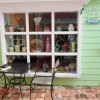Get Stylish with Our Shiny New Writing Style Guide
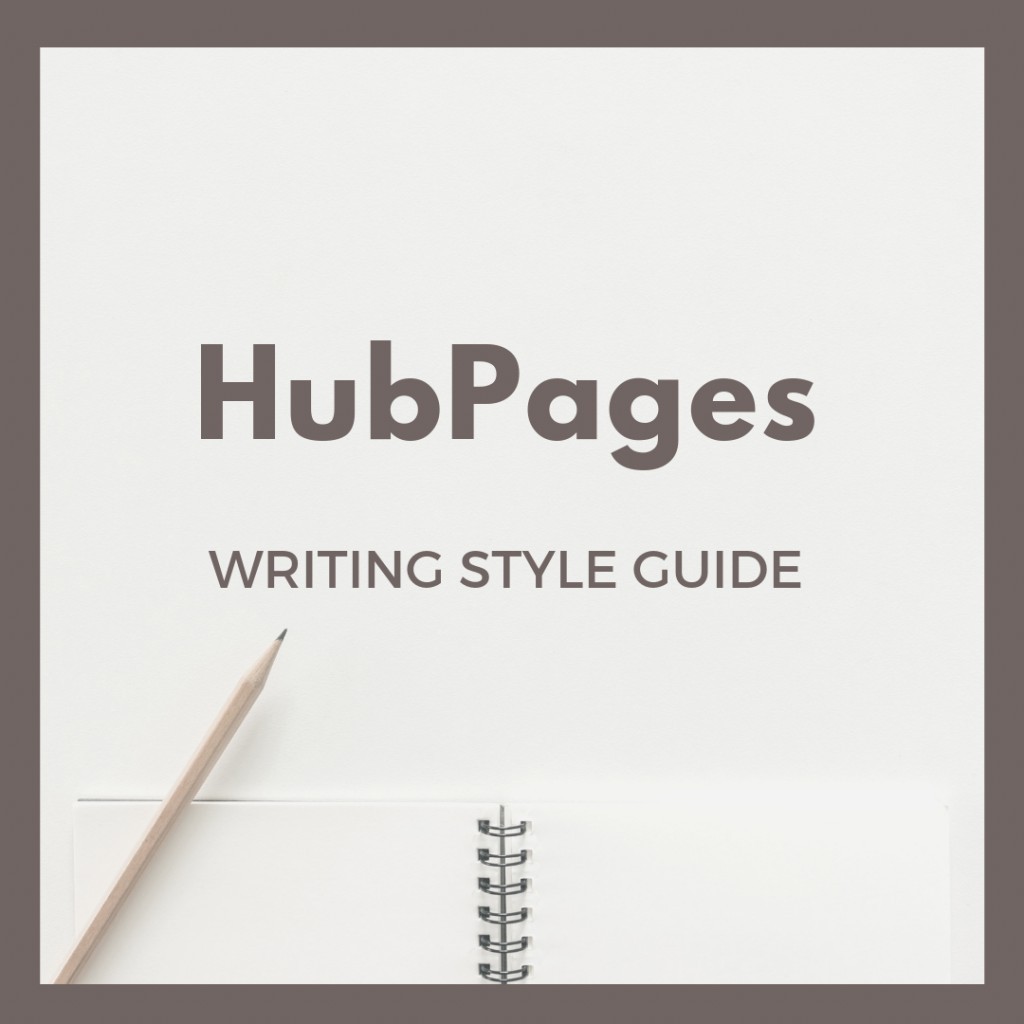
Thanks to our amazing editors Haley, Tessa, and Joanna, what was once an internal style guide has now been transformed into a valuable (and stylish) resource for the entire HubPages community. They tackled this beast of a guide to make it as user-friendly as it is thorough, so we hope you enjoy and utilize their efforts as much as we do!
You can give it a read yourself here >
https://hubpageshelp.com/standards/HubP … tyle-GuideThanks, I bookmarked this guide. I'm sure it will be useful. Great job. Cheers!
I have great respect for the effort, but I wonder why the style guide relies in large part on APA, which is geared toward the social sciences. I don't see much in the way of social sciences on HP sites.
Much of what people write on here is a form of journalism. For that reason, I hope you will consider the AP stylebook as a useful reference going forward.I have bookmarked this for later use. It looks very daunting to me but I am sure it will help me in writing. Thanks for sharing this very interesting and informative article.
I think I like the style guide's amassing so many useful rules and references in one place. Now we need not fly all over the internet to find answers. I like Purdue's OWL, but I think I will enjoy the HP style guide even more.
The new guide looks daunting but exciting. I have so much to study and make sure I follow the style guides. It will take some time to pursue, but worth it in the long run. Thank you, HP, for all your hard work. To a great future!
Oh WOW, just the right thing for me. As English is not my native language, I always struggle with grammar and a lot of other things. Sometimes it was not easy to find the right answer on the internet.
Thank you editors. Bookmarked.Bookmarking is a very big deal to me, I do it seldom. This I bookmarked.
- RTalloniposted 6 years ago
0
Thanks again for the HP Writing Style Guide. Have enjoyed taking a look at it a couple of times already, yet hoping to study it more thoroughly. Definitely appreciate the amount of work that went into it, as well as responses to comments on it.
- Will Apseposted 6 years ago
0
I was at primary (elementary) school in the sixties. Expression trumped grammatical accuracy or authoritarian nonsense like correct spelling. At secondary (high school) the thoughtscape was dominated by science. No one expected science students to know what a run on sentence was. Or is that run-on sentance?
This is why I don't argue with editors. I have no idea what they want or why they want it. lol.
Edit: an ed went through one of my pages today, making many changes. I was genuinely impressed. I'm making a mental note that it is wrong to tease them. - Will Apseposted 6 years ago
0
"Get Stylish with Our Shiny New Writing Style Guide".
Why isn't that "Get Stylish With our new Writing Guide"?Maybe it'll help us become "shiny happy writers holding hands"? ♪ ♫ ♪ ♫ ♪
We are "Stylish" with Our Shiny New Writing Style Guide
I probably shouldn't use these forums as a way to get at stuff I don't quite understand but I always have, lol.
I know the whole punctuation thing drives me crazy and I still cannot quite work out why.
It is sort of like learning mathematics (at school level, anyway). There are no real concepts to hang onto you just have to learn the rules.
But there is more than that going on.Punctuation drives me crazy because I see my errors in my articles much later.
Punctuation? I'll give you punctuation.
--------------------------------
<snipped>Paradigmsearch is just eccentric. He hears a different drummer than most.
HP could of had this, but they said no.
I see my snipped was snipped; to snip or not to snip, that is the question.
Great to have it all together. I will definitely use it to make my articles better.
This looks really useful - thanks. I am interested to see that you are now allowing British English as well as American English. It seemed that in the past you have always corrected my British English to American so I have subsequently attempted to write in American English.
One thing that confuses me though is that you have said that hyphens are not allowed and you must use the em dash. We have never (as far as I am aware) used the em dash in British English - we always use the hyphen. In fact I looked this up and found this http://www.sussex.ac.uk/informatics/pun … ddash/dash and wonder then why we can use British English but not the hyphen? I actually don't even know how to create an em dash on my British keyboard so I have always left the hyphen and just accepted that it will be changed.I thought it was just me, but my Canadian keyboard doesn't seem to have a way of creating an em-dash. Is it one of those deals where you have to hold down F12, Q, and then ask your significant other to come in and hit the space bar?
That must be it! I'm doomed to just a hyphen then with no significant other (unless you count my 5 year old which would probably end up with multiple random punctuation marks!)

I normally use the Character Map for all those funny characters. You can search for things by suggesting keywords. E.g. em dash, pi, square root, delta (for Greek letters) etc, instead of having to search manually through all the character sets.
With my deer-stalker hat on and puffing on my meerschaum pipe I was able to figure this out. Elementary my dear Watson.
I use MS Word and here's the solution. Go to Insert, click Symbol in the drop down menu. The font setting has to be normal; the em dash is the second character on the top row. Click on the character, click Insert then click Close.
That's six steps to put in one simple character. That sounds like the evil Moriarty is behind the requirement.On an American English keyboard, you can make an em dash by pressing "Shift" "Option (or Alt)" and "-" together at the same time!
If one really wants to mess around, there's https://www.alt-codes.net/ ☺
I'm not surprised that there are plenty of ways to make the em dash but my main point was that we don't use it in the UK - we use the hyphen - so why is a hyphen not allowed when British English now is?
We allow British spelling and punctuation for everything except for the dash! We use em dashes across the board, regardless of the author's location.
This "¬" is used in programming, and is meant to represent negation.
The en dash "–" is used to represent a span or range of numbers, dates, or time.
The underscore "_" is a character, not punctuation. It can be used to show a space where one is not allowed (such as in internet usernames, email addresses, and some computer programs).
I just noticed the NumPad/NumLock key disappeared from my keyboard. I wondered when that happened? Dell. Bought the thing years ago. Times change. Obsolete I am. †
I think it's only on keyboards with a separate number keypad (desktopl PC keyboards and newer laptops).
The quality of laptop keyboards has regressed and become Neanderthal over the past 7 years or so to the point that they're not much better than membrane keypads on remote controls.
Time for Aussies, Kiwis, English, Irish, Scots and Welsh to celebrate!
Samantha wrote 'We allow British spelling and punctuation for everything except for the dash!', so I followed the link in the new Style Guide to see what was actually listed under 'key differences between British and American punctuation'.
This might not seem a big deal to US writers, but for this Australian (who happens to be a published author and retired mainstream journalist), it will make a significant difference to the level of frustration I experience when publishing via HP.
What a relief. I can choose to publish articles using single quotation marks without having them changed by editors. I won't have a period added when I write about Dr or Mr Whoever. I don't have to put an apostrophe when writing about the 1970s ... and I get the option to write times as 3.30pm if I choose, instead of 3:30.
I'm still puzzled by HP insisting we use the em dash, which is alien to readers who don't buy their newspapers in the US. Butterfly67 asked 'why' but didn't receive an explanation. (Perhaps you could offer a reason that makes sense, Samantha. Do you need evidence that what we say is true?) We use a space, hyphen, space where you use the em dash jammed up against both words. The em dash is making its way into newspapers these days, but there is still always a space on either side. Can we perhaps meet midway with the compromise of an em dash with elbow room?
Anyway, here begins the quote (followed by the link) for the benefit of those who like to 'write British'.
Titles
Mr., Mrs., and Ms. all take periods in American English. In British English, the periods are omitted.
Dates
British usage omits the apostrophe in the plural form of dates (e.g., 1980s), whereas the American practice more often includes it (e.g., 1980’s). The British style is gaining ground in America, however.
Though not necessarily a matter of punctuation, there is one important distinction between American and British usage when it comes to dates. American usage puts the month first, followed by the day, and then the year. Hence, 12/5/2010 means December 5, 2010, in American usage. The British practice (followed in most of the world) is to put the day first, followed by the month. Hence, 12/5/2010 means May 12, 2010, in British usage. The International Organization for Standardization (ISO) has established the YYYY-MM-DD format, in which December 5, 2010, would be written 2010-12-05. Whether this will catch on with American writers remains to be seen. In the meantime, writing out the month will avoid confusion.
Time
British usage dictates a period between the hours and minutes when writing the time (e.g., 10.30). American usage dictates a colon (e.g., 10:30).
Quotations
American style uses double quotes (“) for initial quotations, then single quotes (‘) for quotations within the initial quotation.
“Economic systems,” according to Professor White, “are an inevitable byproduct of civilization, and are, as John Doe said, ‘with us whether we want them or not.’”
British style uses single quotes (‘) for initial quotations, then double quotes (“) for quotations within the initial quotation.
‘Economic systems’, according to Professor White, ‘are an inevitable byproduct of civilization, and are, as John Doe said, “with us whether we want them or not”’.
The above examples also show that the American style places commas and periods inside the quotation marks, even if they are not in the original material. British style (more sensibly) places unquoted periods and commas outside the quotation marks. For all other punctuation, the British and American styles are in agreement: unless the punctuation is part of the quoted material, it goes outside the quotation marks.
https://www.thepunctuationguide.com/bri … style.html
Thanks to HP for finally making these changes.Thanks LongTimeMother. We Canadians can celebrate too. We mostly follow British practice in writing and always get a bit sensitive when we are lumped in with our cousins to the south and left off lists. I know it sounds a bit needy but we do have a separate identity from Trumpland.
And, thanks for raising the em dash issue. It's been addressed in this thread before and, as far as I know, the ruling stands. The trouble is that my keyboard and that of many others has no provision for an em dash. It involves a labourious multiple-step process. So I just go with the space-hyphen-space protocol and let the editors fix it if they choose, which they often don't. That's why they're paid the big bucks.It's been in our style guide since the beginning. Changing it would cause inconsistency across the site.
If some people are using the dash and some aren't, it can cause some confusion for readers, as "-" or "--" can be read differently depending on where the reader is from. Other British English rules, including the date, title, and quotations, are much easier to "get."
We do try to change them when we go in for edits, but not all articles need one to be considered for a Network Site, so we wouldn't go in just for that.
This article is pretty helpful in explaining our love for the em dash: https://www.grammarly.com/blog/why-you- … e-em-dash/I followed your link to grammarly to understand your love for the em dash, Samantha. Thank you. It was very enlightening.
Now on behalf of the Canadians, Australians, New Zealanders, English, Irish, Welsh and Scottish writers here at HP (and maybe others I've not thought to mention), I'm highlighting what I discovered on that page:
'Putting spaces before and after an em dash is a matter of preference; just be consistent.'
https://www.grammarly.com/blog/why-you- … e-em-dash/
So it seems that even in America there's the option of allowing 'elbow room' for the em dash with a space before and after it. I'm sure Americans are smart enough to 'get' the role of the em dash used in the British way. Surely a couple of spaces isn't going to throw the average reader off the scent of intent?
Are we closer to a compromise?If I understand correctly, you mean:
"word — word" vs. "word—word"?
While yes, there is some wiggle room in terms of general grammar, our network still prefers there to be no space. We have our own style guide (that we just published, hence the forum post), and like to stick to it.
Most editors are trained to remove them. Again, it is a matter of aesthetics. Too many spaces makes the text look choppy.
For the writer, I hope that not adding a space between words isn't too torturous!Yes, Samantha, you understand correctly. Here's a quote from the University of Sussex that explains it:
There are two slightly different conventions for using a dash. The more modern one is to put white spaces at both ends of a dash, while the older style uses no white spaces at all, but writes the dash solid next to whatever precedes and follows it. Both conventions are in use, and hence you may see either of the following:
The Serbs want peace — or so they say.
The Serbs want peace—or so they say.
http://www.sussex.ac.uk/informatics/pun … ddash/dash
Interesting how it says the 'more modern one'. The copyright on the article is 1997. So putting white spaces either side of the em dash was 'more modern' twenty years ago. Shows it has been done for a long time now.
Funny how you say 'too many spaces makes the text look choppy'. For those of us who have grown up with space either side, removing them makes the text look cramped and 'wrong'. So essentially it is a cross-cultural difference.
Of course it isn't 'too torturous' for writers to not add the spaces. The actual torture is experienced by each of us as readers, not writers. Other readers from our parts of the world would find it equally uncomfortable, and we mustn't forget we are all aiming to keep readers happy.
That's why I'm suggesting a compromise. We'll use the em dash to satisfy US readers, but I'm suggesting HP allow us to add spaces to satisfy readers from elsewhere.
I'll attach images showing some of my stats from a couple of articles so you can see why I'm suggesting this. Not all readers come from the US. Most, probably, but certainly not all.
I actually attempt to avoid using the em/en dash. Where possible, I restructure the sentence. But when a sentence screams out for it, I'm forced to oblige.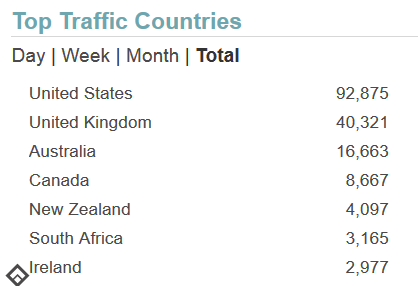
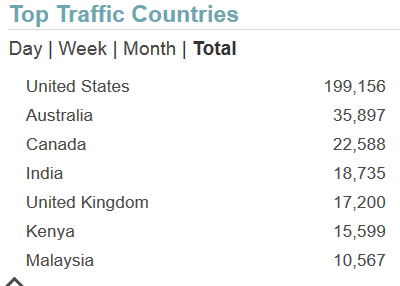
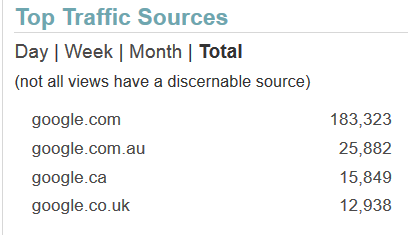
The recent changes are brilliant, no denying. I just think it would be nice if we could completely bridge the cross-cultural divide. As my grandmother used to say, 'The answer's always "no" unless you ask.'We are a site that operates in the U.S., so we design our style to that readership. Unfortunately, there is no possible "compromise" in regards to the rules (otherwise they wouldn't be rules). Of course, you can do as you like, but know that they will probably be changed.
Can’t help but chuckle a little. ‘Unfortunately, there is no possible "compromise" in regards to the rules (otherwise they wouldn't be rules).’
Makes sense, if you’re not aware of the rule that says: ‘We allow British spelling and punctuation for everything except for the dash!’
Seems a minor adjustment to transform into the proposed rule, ‘We allow British spelling and punctuation for everything including the dash.’ I’ll leave the suggestion on the table but won’t lose sleep over the outcome.
Paul and the team have done a terrific job creating a global network of writers. I’ve watched many non-Americans be prolific writers and enjoy significant success in the 7 years I’ve been here. Sadly, many are no longer active in forums; some are no longer active at all on HP.
I hope people still remember members like Marisa Wright and Writer Fox. Both were incredibly helpful on forums. Neither show ‘recent activity’. What a loss! Nell Rose is still active but I’m not sure how often she checks the forums these days. Lots of other international ‘greats’ spring to mind. (I’m thinking Dr Mark deserves an award for persistence and resilience as an international contributor, lol.)
In recognition of Paul and Robin’s unwavering commitment to accommodating international writers (and mainly due to the recent ‘British’ changes), I will now begin recommending HP to other Australian writers. I’ll just warn them to avoid the em dash obstacle!
It has taken seven years, but I’m finally confident most of the frustrations writing for HP’s American-based site/s have been resolved. Watch for even more international writers!
Sorry, Rupert. I've added Canadians to my latest list of those with an interest in avoiding the space-crowding em dash. My keyboard also has no em dash. I can use - or ~ or, if pushed, -- (two hyphens).
But if I'm going to use two hyphens, I'd still like the space either end -- like this!
I wonder where the em dash appears on US keyboards. Perhaps someone could tell us.The em dash is made with "Shift" "Option" and "-". There is no em dash option.
You should be able to do it with, "-" "Opt ⌥" "Shift ⇧".
I don't have a clue what the 'Opt' key is. I tried replacing it in the combination with the 'ctrl', 'fn' and 'alt' keys with no success.
Okay, so I googled. Discovered the opt key is only on apple computers.
Found these instructions for creating em dash on a PC computer:
The em-dash can be created on the PC by using holding down the ALT key and typing 0151 on the numeric keypad. Only the numbers on the right hand keypad do this, not the numbers above the letters. On the Mac, press Shift-Option and the minus key to make en em-dash.
I have to hold down alt and press five digits??
— is the result of doing it.
- is a normal hyphen.
Am I the only one who thinks the — is wider than the capital M?
Hi Samantha. I would be happy to comply with the em dash protocol you want if I could insert it with ease from my PC keyboard. But the Ctrl number key pad palaver is onerous. My compromise is to avoid, as far as possible, the use of hyphen/em dash marks. I'll use brackets and, at a stretch, semi colons instead. However, if unavoidable the hyphen will go in and I'll let you guys make the change, or not.
I’m with you, Rupert. By the way, I just noticed you’ve written an astonishing 466 articles in just three years! Clearly you’d count high among HP’s esteemed and ‘valuable’ international writers.
Just scanned your ‘Prison Survival Skills’. Brilliant. I’m going back to read it all, even though I trust I’ll never need those particular skills.
If ever I have a spare week with nothing else to do, I’ll check out the other 465!There's nobody forcing you to use it! I know that's it's difficult to do on a UK keyboard. We ask that from people who can do it easily. I'm just trying to explain that section of the guide, and let you know that an editor will probably change it if they see it.
Thank you so much for the new style guide.. I have decided to rekindle my Hub Pages writing and this will be a tremendous help!!
Thank you LongTimeMother. Writing for HubPages is pretty much what I do these days. I love it. I hasten to add that the Prison Survival Skills piece does not spring from personal experience.
- Will Apseposted 6 years ago
0
I demand a return to the true punctuation and grammar of Olde England, immediately!
Please find, enclosed, a sample of what I'm expecting.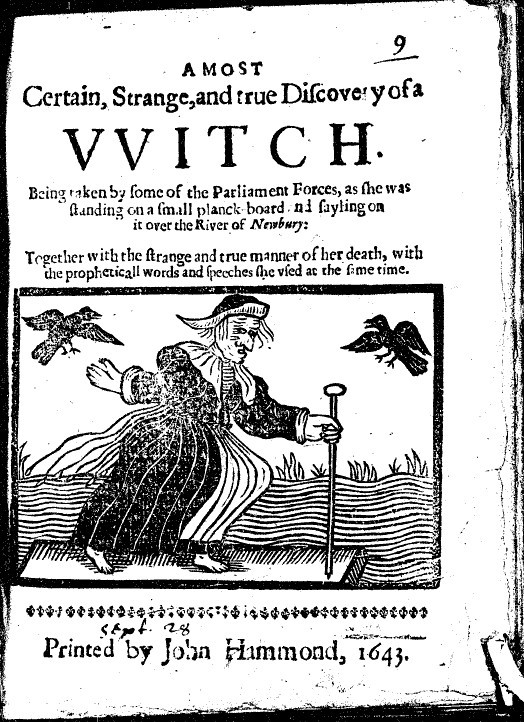
If you can make enough sense of the horror contained within this document (as a primary source) to be shocked. you might be less in need of the "mechanics" than you think.
Please add whichever commas etc you need...Grammar punctuation was not a big deal back then. The patriarchy was more interested in the oppression of strong women.
I am working on a new hub.. My first hub in years and the "Hub Pages Writing Style Guide" has helped me tremendously! This is a fantastic resource for anyone who wants to write fantastic, intelligent sounding hubs!
Good morning miss Samanthacubbison. I want to say, thank you for taking the time and rewrite the hub pages rules in a easier way to understand. I want to wish you a pleasant day.
















